Erstellt am: 23. 7. 2013 - 11:06 Uhr
Riding To Connect
The bunch of Ride For Your Rights activists are pedalling leisurely through the forest flood plain along the Danube from Vienna to Bratislava. The sun-scorched path is lined with towering wetland trees which obscure the view to great connecting river.
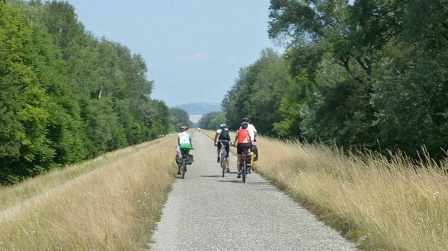
chris cummins
This relentlessly straight track is the first stage of a mammoth ride that will take the group of student activists and sympathisers over 5,000 kilometres through Austria, Slovakia, Hungary, Croatia, Serbia, Bulgaria and finally to the Turkish capital Ankara, acting, in the words of organiser, Julian Walkowiak, as a “moving megaphone” for a more mobile Europe.
“We're riding for student rights,” says Walkowiak . “We are riding so more young people can have the chance to spend more time abroad with student programmes.”
Since its inception 26 years ago, the number of countries taking part in Erasmus, the best known European student exchange program, has grown from 11 to 33, including non-EU members such as Turkey. Already three million students have benefitted from the chance to study abroad.
But Ride for Your Rights says that is still far too few, with only 4% of European students spending semesters abroad. “It is imperative to enable the continent's youth to experience Europe in all its beauty and diversity,” declares the group's manifesto. “Education is the most potent answer to bring about a tolerant and respectful society.”
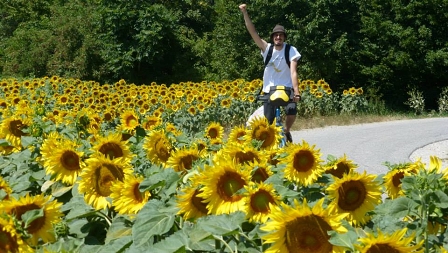
chris cummins
Julian Walkowiak says that education can't only be based on national ways of thinking. “Everyone who lives in Europe should get an idea of what Europe means and in order to do that you need the opportunity of spending time abroad. Then you can compare two different countries, two different languages and two different cultures.”
On their way across Europe Julian and his merry band of cyclists are not just turning the pedals but are trying to influence policy by meeting politicians at each stop along the route. “We tell them what they need to change in order to make people more mobile.”
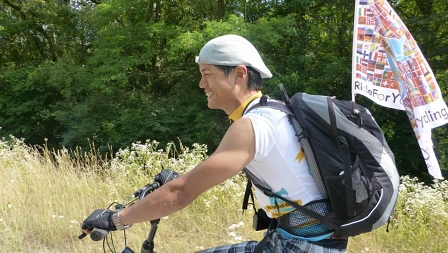
chris cummins
The cyclists themselves are very international – as well as Austrians, there are riders from Germany, the Czech Republic, Serbia and even the ever-smiling Shuji Shimada from Japan, who is currently studying in Frankfurt. As they left Vienna they were waved off by the Vice-President of the European Parliament, ÖVP politician Othmar Karas who said he believed the bike ride can help bring change, asserting that the Erasmus programme is a “key element” in creating a more integrated Europe “It's a question of understanding and communication. The bicycle is an instrument. Young people are at the heart of the future of the European Union.”
Fine words, but Walkowiak would like to see Brussels putting its money where its mouth is. He says the group is “riding for 2020” – the next time that an EU budget will passed. “For the next seven years we want to put pressure on the EU Commission to dedicate more funds to education and student mobility.”
The EU ministers of education have committed to raising the student exchange participation rate by 20% by 2020, and there is a European target, under a programme dubbed “Erasmus For All” which aims to see an additional five million students studying abroad between 2014 and 2020, but at the moment Walkowiak says the offer is simply not good enough:
“Why is the participation rate so low? There is not enough financing and the universities are too strict – they don't recognise enough of the courses you take abroad. If those obstacles are removed maybe we can hit those targets.”
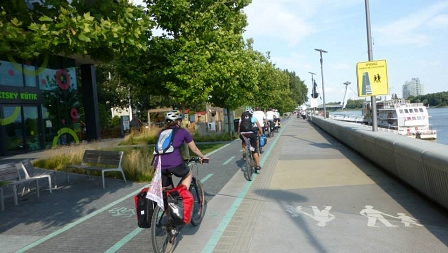
chris cummins
In the early evening, with the group's motto emblazoned on flags that stuck out above the cyclists' back wheels like the wagging tails of a pack of terriers, the cyclists coast on into Bratislava where they are greeted by MEP Monika Flašíková-Beňová. “I can't imagine cycling 5,000km,” she gushes. “This is about the future,” she adds “and more mobility has to be part of that future.”
Cycling to Ankara will involve the cyclists spending weeks on the road. Participants can join and leave when they want, but the full ride will stretch well into September and so the student activists have to travel cheaply. This means buying provisions in supermarkets along the way and saving on accommodation, sleeping on the floors of school gymnasiums and camping. Tonight they are beds but they are in cramped and dirty rooms in the tower block halls of residence on the depressing edge of Bratislava. It takes three hours of frustrating bureaucracy just to check in – and I am already beginning to admire the riders' optimism and resilience. Still the 60cent chocolate croissants in the morning are a cyclist's dream.
Dieses Element ist nicht mehr verfügbar
It's a sleep-deprived bunch that heads back into Austria along a route that tracks the former Iron Curtain. There's a poignant symbolism here. This once fortified line was once used to separate people with a shoot to kill deterrent. Now much of the route is now part of a giant nature reserve that hosts a cycle path that helps connect people.
“We wanted to give the ride a bit of a historical element,” says Walkowiak. Later in the day we will pass Sopronpuszta near the Neusiedl Lake, the site of 1989's Pan European Picnic where Laszlo Nagy helped melt the Iron Curtain by sizzling some sausages.
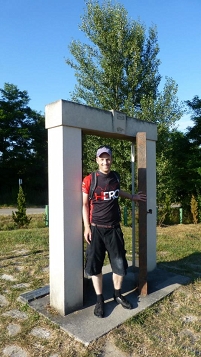
chris cummins
As the road passes fields of garish sunflowers I cycle alongside Arne Traun from Salzburg. He works for a student exchange programme called Campus Europae, which offers longer periods abroad than Erasmus and he spent a year abroad in Portugal himself.
“I think these exchanges are really important,” he says. “You take so many memories back with you, you meet so many new people and have so many new experiences. I think it makes you more open minded.”
I leave the group at Sopron in Hungary and head back to Austria. They are headed down to Szombathely, then Maribor in Slovenia and Zagreb in Croatia. It's a long road ahead but they are riding with idealism. Arne, for example, is pleased that the ride will spend so many weeks inside Turkey, reaching out to potential exchange students there and “by promoting human rights” the group is showing solidarity with the protesters of Gezi Park. That's the key to exchange programmes for the Ride For Your Rights activists: it is not just about improving your CV for the job market, it's about nurturing tolerance and understanding.
Part of the manifesto reads “Europe's future relies on citizens who will respect human rights and banish prejudice, hatred, and racism.”
Amen to that.


